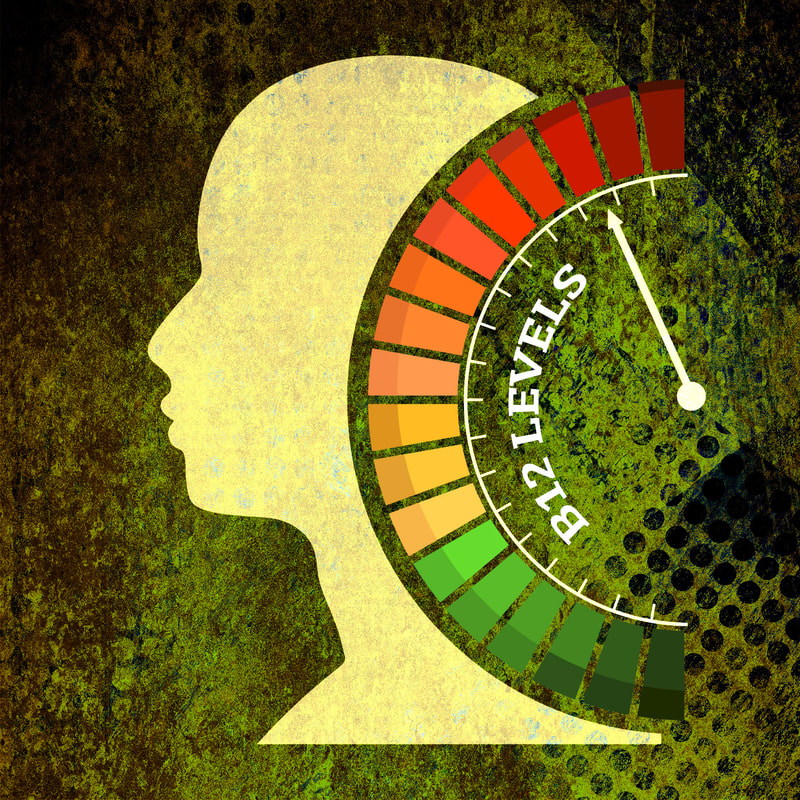Yet we also know that very large doses of this vitamin could result in some negative impacts especially in patients with diagnosed kidney disease or diabetes. In studies that used high-dose injectable supplementation, a greater risk of heart attack, stroke and death was observed, compared with the group participants who received a placebo.2
Of significance too is an extensive Danish cohort investigation that showed a correlation between high B12 levels and the risk of some cancers. In this study, researchers identified 333,000 people, average age 55 years old, who despite not being on any supplementation had B12 levels above 600. Those with B12 levels greater than 800 had more than twice the risk of developing cancer within a year or two of the study than those with lower levels.3 Note that the study excluded patients receiving intramuscular (IM) B12 injections. These findings are interesting because in order to support brain health, we almost always strive for a B12 level greater than 600, but physiological supplementation rarely raises blood levels very much above 600. In patients with amyotrophic lateral sclerosis (ALS), for example, very large doses up to 25-50 grams are IM-administered twice weekly. So it appears that the mechanisms of a link between B12 levels and cancer is perhaps poorly elucidated by this particular study; certainly, more research and insight from hematologists would be warranted to better understand the Danish study results. What is one explanation? It’s possible that increases might be due to changes in cobalamin metabolism caused by cancer and should not suggest that B12 supplementation can cause cancer. So, in cancer patients, the B12 level just naturally may be higher as a result of disease activity. So my practice is to first obtain every patient's baseline B12 level. To optimize brain health we typically like to see the B12 level greater than 600 but ALL of the eight B vitamins are important for brain health.4 The B vitamins play critical interacting roles in the majority of our cellular functions. And, these days, it is virtually impossible to get the ideal amount of B vitamins from our diet alone. I recommend that all of our neurology patients take a high quality, B-complex supplement, once or twice daily with meals; as one option, we like the formulation by Pure Encapsulations. And even though we may not be able to get enough B12 from the foods we eat, don’t rely only on vitamins as a substitute for eating a healthy and balanced diet! Some good sources of B12-rich foods include:
It’s important to understand the relationship between maintaining optimum levels of all nutrients whether you have a neurological condition or not – as we’ve often discussed, there is a wealth of evidence that indicates just how key our gut health is to our brain and overall health so please take a couple of minutes to read our related blog for additional information. If you need help planning a dietary program based on your individual needs, talk to us, your family physician or nutritionist and really give yourself the best foundation for better health! In health and healing, Dr. Suzanne Gazda References 1 American Academy of Neurology https://www.aan.com/PressRoom/Home/PressRelease/986 2 Healthline: vitamin B12 https://www.healthline.com/nutrition/too-much-vitamin-b12#helpful-or-harmful 3 Arendt, J. F., Pedersen, L., Nexo, E., & Sørensen, H. T. (2013). Elevated plasma vitamin B12 levels as a marker for cancer: a population-based cohort study. Journal of the National Cancer Institute, 105(23), 1799–1805. https://doi.org/10.1093/jnci/djt315 4 Kennedy D. O. (2016). B Vitamins and the Brain: Mechanisms, Dose and Efficacy--A Review. Nutrients, 8(2), 68. https://doi.org/10.3390/nu8020068
0 Comments
Your comment will be posted after it is approved.
Leave a Reply. |
AuthorDr. Suzanne Gazda, Integrative Neurology Archives
February 2024
Categories |

 RSS Feed
RSS Feed